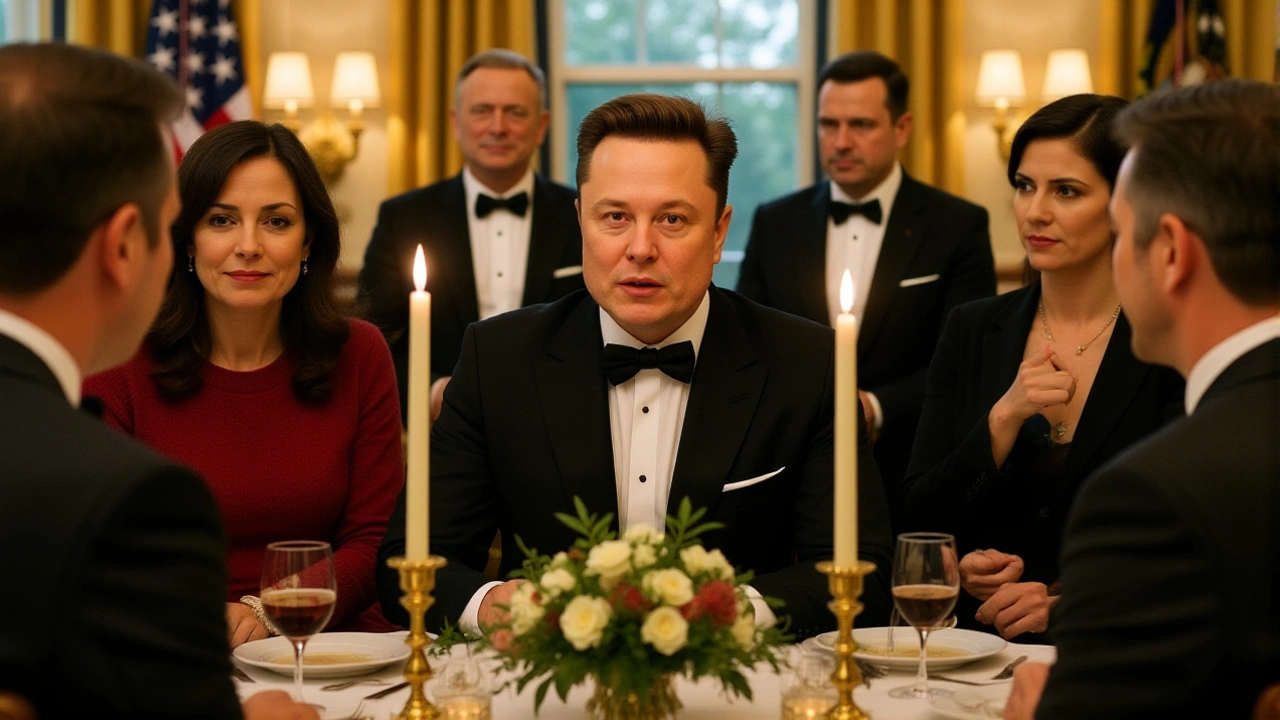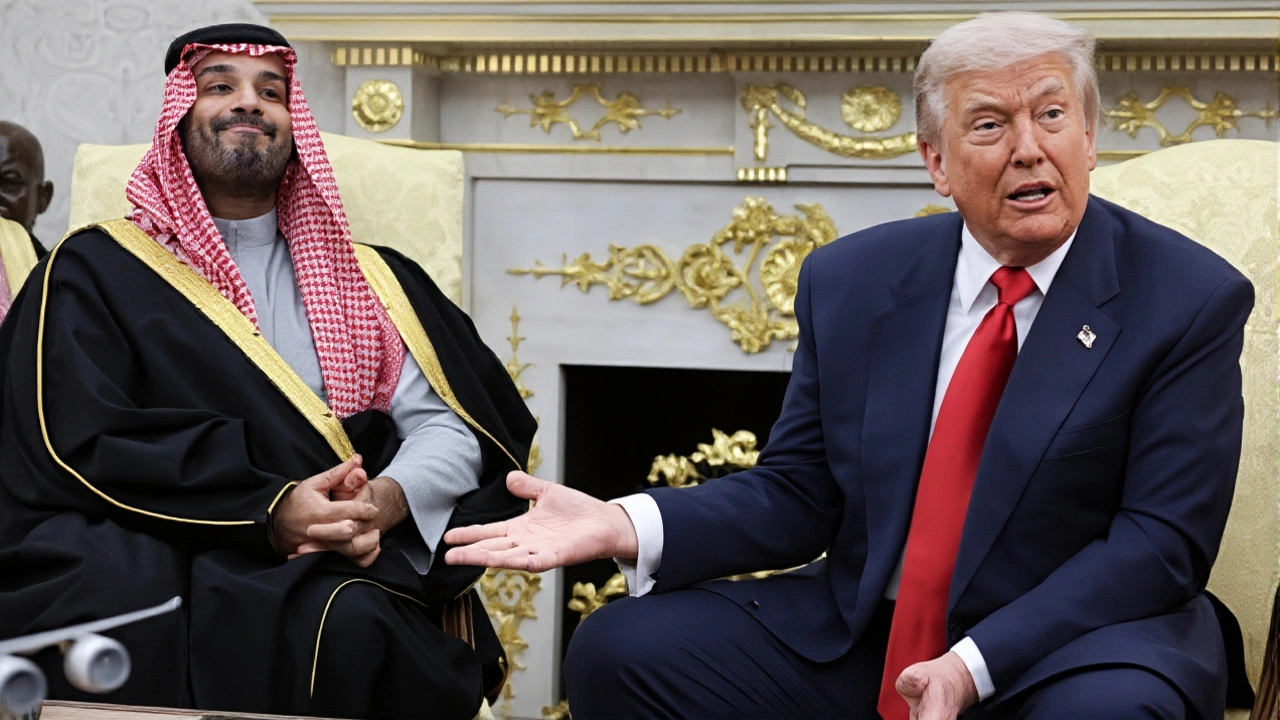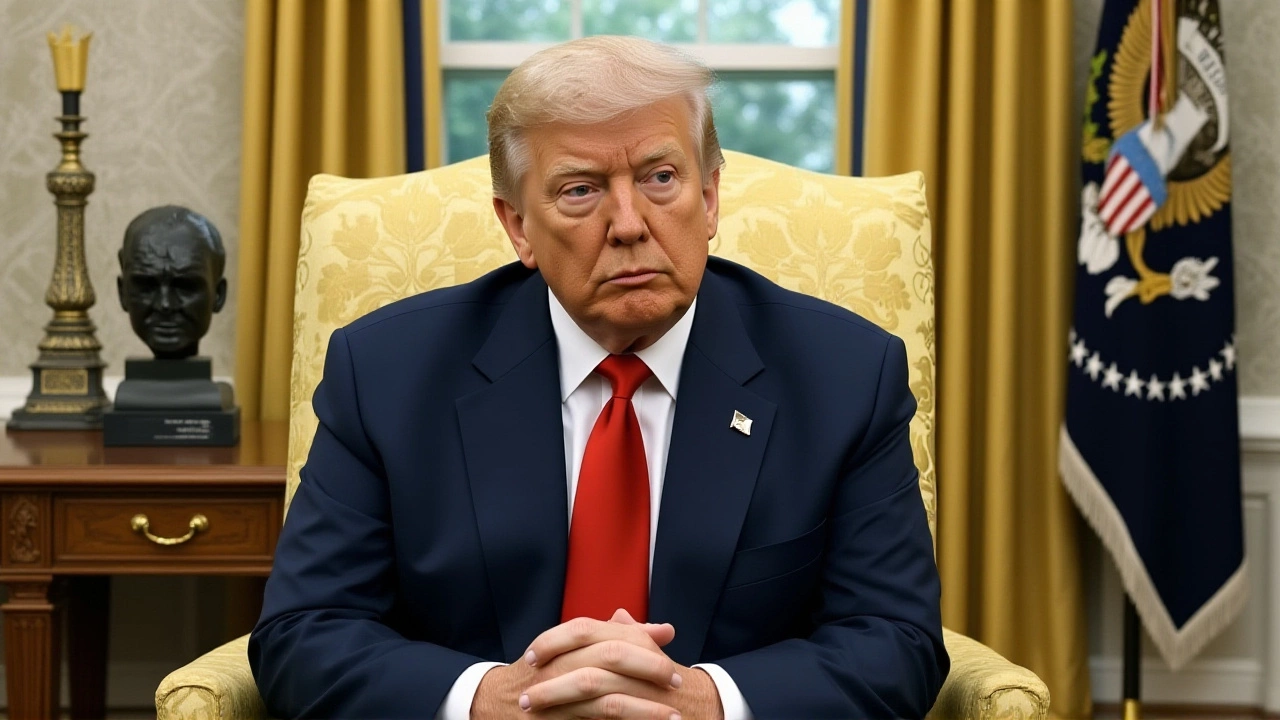When Donald J. Trump told Mary Bruce to stop questioning Crown Prince Mohammed bin Salman about Jamal Khashoggi’s murder, he didn’t just shut down a reporter—he rewrote history in real time. The moment happened on the White House Oval Office meetingWashington, D.C. on November 20, 2025, as Crown Prince Mohammed bin Salman sat across the room, freshly arrived for his first U.S. visit since 2018. Bruce, ABC News’s chief White House correspondent, had simply asked about the 2018 killing and the lingering anger among 9/11 families. Trump’s response? "You don’t have to embarrass our guest, asking a question like this." And then, with chilling finality: "He knew nothing about it. We can leave it at that." Here’s the thing: that’s not just denial. It’s a direct contradiction of the U.S. intelligence community’s 2021 declassified report, which concluded with "high confidence" that Crown Prince Mohammed bin Salman approved the operation that led to Jamal Khashoggi’s brutal killing inside the Saudi consulate in Istanbul on October 2, 2018. The CIA didn’t speculate. They documented the call logs, the forensic evidence, the body disposal team’s text messages. And now, the president of the United States is telling the American public to forget it. The optics were surreal. Earlier that day, Crown Prince Mohammed bin Salman stepped onto the White House South Lawn to a red carpet, a horse-mounted honor guard, and a military band playing both national anthems. It was the kind of welcome usually reserved for allies, not accused murderers. Donald J. Trump called him "an indispensable player in shaping the Middle East." That phrase echoed through the diplomatic corridors, but for Jamal Khashoggi’s widow, Hatice Cengiz, it felt like salt in an open wound. "Say I did not receive official apology," she said in a statement. "Why should Americans trust? Who are you with?" The prince himself offered a carefully crafted apology. "It’s really painful to hear, anyone losing their life for no real purpose," he told reporters. "We’ve done all the right steps... improved our system." But those "right steps" included convicting five low-level operatives, while the masterminds—those who planned the hit, who flew in from Riyadh, who brought the bone saw—walked free. The Saudi justice system, as one U.S. diplomat put it, "is a theater where the script was written in Riyadh." And now, with Trump’s endorsement, the world is being asked to accept that script as truth. The 9/11 angle made it worse. Fifteen of the 19 hijackers were Saudi nationals. While the 9/11 Commission never found direct evidence that the Saudi government ordered the attacks, families have spent decades demanding transparency about possible state support. Trump, who has long avoided criticizing Riyadh, dismissed the concerns with a wave: "A lot of people didn’t like that gentleman that you’re talking about." He was referring to Jamal Khashoggi, the Washington Post columnist who’d written critically of MBS’s crackdowns, his war in Yemen, and his consolidation of power. But Khashoggi wasn’t a radical. He was a reformist, a father, a U.S. resident who’d fled Saudi repression to write in peace. His crime? Speaking truth. Karen Attiah, Khashoggi’s colleague at The Washington Post, didn’t mince words. In a Substack post titled "Jamal Khashoggi Will Haunt Mohammed Bin Salman Forever," she wrote: "The Saudi crown prince accused of ordering the murder of my friend... gets the (blood) red carpet treatment." Her words went viral. So did the image of Crown Prince Mohammed bin Salman smiling beside Trump, the American flag waving behind them, as if the past seven years never happened. But the past doesn’t vanish just because someone turns off the microphone. The FBI still has the audio recordings from inside the consulate. The Turkish prosecutors still have the forensic reports. And Jamal Khashoggi’s widow still waits for justice. What’s happening here isn’t diplomacy. It’s amnesia on a national scale.
What Led to This Moment?
Crown Prince Mohammed bin Salman first visited the White House in 2017, when Trump was eager to sell $110 billion in arms to Saudi Arabia. That relationship deepened after the 2018 Khashoggi killing, when Trump declared, "I don’t want to lose the business." Seven years later, the calculus hasn’t changed—except now, the U.S. is more dependent on Saudi oil as global energy markets shift. MBS, meanwhile, has spent billions on PR firms, celebrity endorsements, and lobbying to scrub his image. He’s hosted Elon Musk, bought Manchester City, and funded Hollywood films. The goal? To be seen not as a dictator, but as a modernizer.How the U.S. Intelligence Community Responded
The August 2021 report from the Office of the Director of National Intelligence didn’t mince words. It stated: "The Crown Prince viewed Khashoggi as a threat to the Kingdom and broadly supported using violent measures if necessary to silence him." That wasn’t speculation—it was based on intercepted communications, financial trails, and testimony from Saudi insiders. Even the State Department’s own diplomats privately confirmed the findings. Yet, the Biden administration chose not to publicly sanction MBS, fearing destabilization in the region. Now, Trump’s comments have effectively erased that report from public discourse.
Who’s Paying the Price?
It’s not just Jamal Khashoggi’s family. It’s every journalist in the Middle East who now fears that speaking out won’t just land them in prison—it’ll get them killed, and no one will care. It’s the 1,200 families of 9/11 victims who’ve fought for accountability for 24 years. And it’s the U.S. reputation as a defender of human rights, now reduced to a bargaining chip in oil deals and arms contracts.What’s Next?
Congress has begun drafting legislation to require the State Department to publicly certify that foreign leaders visiting the White House have not been implicated in extrajudicial killings. The Senate Foreign Relations Committee plans hearings in January. Meanwhile, the Department of Justice is still reviewing whether to pursue charges under the Alien Tort Statute, which allows U.S. courts to hear cases involving human rights abuses abroad. The clock is ticking—but so far, silence is the administration’s policy.
Why This Matters Beyond the Headlines
This isn’t just about one reporter being shut down. It’s about whether truth still has a place in American diplomacy. When a president chooses to erase documented atrocities to please a foreign autocrat, he doesn’t just betray the victims—he betrays the American public’s right to know. The world is watching. And so are the families.Frequently Asked Questions
How did Donald Trump’s comments contradict U.S. intelligence findings?
Trump claimed Crown Prince Mohammed bin Salman "knew nothing" about Jamal Khashoggi’s murder, directly contradicting the August 2021 U.S. intelligence report that concluded with "high confidence" that MBS approved the operation. The report cited intercepted communications, financial records, and witness testimony linking MBS to the planning of the killing inside the Istanbul consulate.
What has Saudi Arabia done to address Khashoggi’s murder?
Saudi Arabia prosecuted five low-level operatives, sentencing them to death or prison terms, but spared the senior officials who reportedly ordered the hit. The kingdom claims it has "improved its system," but no high-ranking officials have been held accountable. International observers, including Human Rights Watch, call this a show trial designed to deflect blame.
Why is the 9/11 connection significant in this context?
Fifteen of the 19 September 11 hijackers were Saudi nationals, and families have long sought answers about potential Saudi state support. While no official link to the Saudi government was proven, Trump’s dismissal of these concerns—alongside his defense of MBS—fuels distrust among victims’ families who see U.S. foreign policy as prioritizing alliances over justice.
What role did Mary Bruce play in this event?
As ABC News’ chief White House correspondent, Bruce asked the only direct question about Khashoggi and 9/11 during the meeting, forcing a public reckoning. Trump’s angry response—"You don’t have to embarrass our guest"—was widely seen as an attempt to silence accountability journalism at the highest level of government.
Is there any legal recourse for Khashoggi’s family?
Yes. The U.S. Department of Justice is reviewing a potential case under the Alien Tort Statute, which allows U.S. courts to hear claims for human rights violations committed abroad. Khashoggi’s widow, Hatice Cengiz, is also pursuing civil litigation in Turkey and the U.S., though political pressure has slowed progress.
What’s the global impact of Trump’s endorsement of MBS?
It signals to other authoritarian regimes that human rights abuses can be erased with a handshake and a photo op. Journalists in Egypt, China, and Russia have noted the precedent: if the U.S. president overlooks murder for political gain, why shouldn’t other nations do the same? The moral authority of American foreign policy has taken a significant hit.
